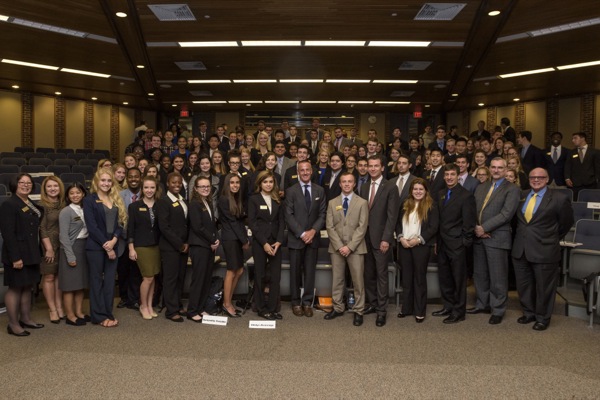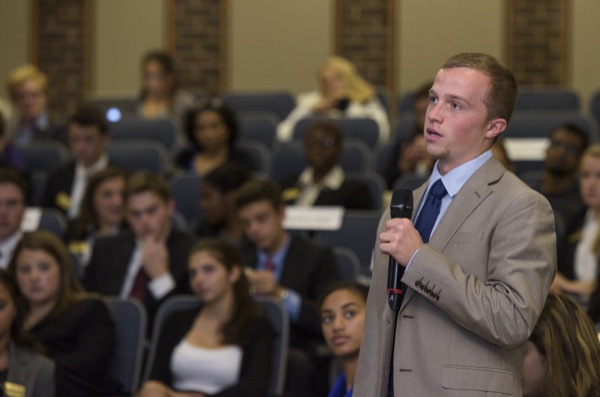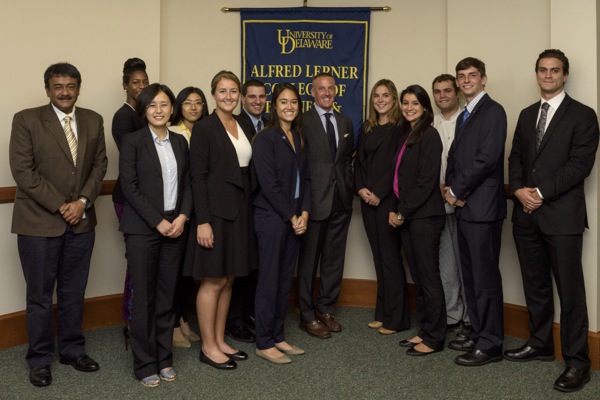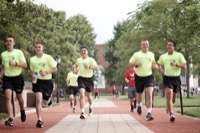

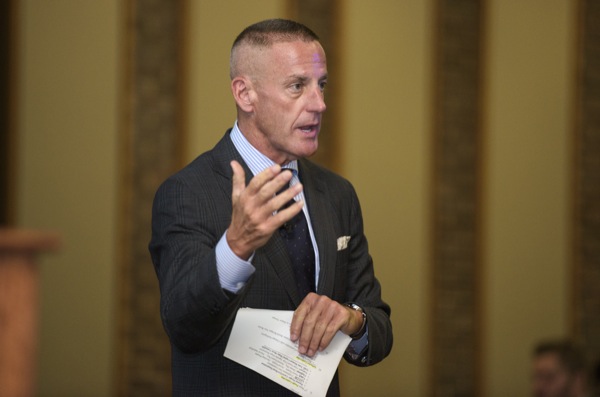
A model of leadership
CEO Eric Foss discusses what it takes to become a successful leader
6:39 p.m., Oct. 7, 2015--Anyone who’s grabbed a convenient 20-ounce drink from a grocery store aisle mini-refrigerator has Eric Foss to thank.
Foss and his team created the idea for aisle mini-fridges during his time at Pepsi Bottling Group, when the team discovered that half of grocery store customers go through the express aisle.
People Stories
'Resilience Engineering'
Reviresco June run
This idea eventually became a huge and profitable success that strongly affected the beverage industry, but Foss and his team took chances and suffered financial losses to get there.
This willingness to take risks and create innovative ideas represents one part of the leadership model that Foss shared with University of Delaware students during the Oct. 1 Chaplin Tyler Executive Leadership Lecture.
Foss, who currently leads a team of 270,000 employees as chairman, president and CEO of Aramark, said that he wanted to provide UD students with the advice that he would have appreciated as a university student.
“If I had a wish when I was sitting in your shoes… it would be for somebody to talk to me, even before my career started, about the topic of leadership,” Foss said. He called leadership “the most important thing for you to carry forward, almost regardless of what career you pick.”
Foss urged young professionals to ask themselves questions like “How do you define leadership?” and “What are the characteristics that you think great leaders possess?”
His own model is formed around the typical trajectory of a young professional’s career and which skills might be required of them at each stage.
This begins with an employee’s values and determining whether or not they fit with those of the company.
“Aramark’s a company that’s all about doing the right thing,” Foss said as an example, discussing Aramark’s multiple recognitions from Ethisphere as a highly ethical company.
“It’s all about character and putting others first. Are you bigger on the inside than you are on the outside?”
Once an employee has been hired, Foss said that the next step is the ability to provide good and consistent work.
“Early on, typically you’re going to be an individual contributor,” Foss said. “The real question that they’re looking for you to demonstrate is: Can you deliver results?”
During this time, Foss said, professionals should build their knowledge about their industry and choose which path they will take to deliver those results.
“One of those paths is to choose character and the other path is to choose compromise,” Foss said. “It’s critically important for anybody who wants to lead going forward that when you reach that crossroads you make the right choice, and that’s the path of character.”
The next step in a professional career, Foss said, often involves being responsible for the work of others, making the next dimension of his leadership model all about people and maximizing the potential of a team.
“Being a good coach and making sure that you can develop a team is extremely important to being a good people-leader,” Foss said.
The next steps of Foss’ leadership model, influence leadership and idea leadership, involve skills that are valuable later in a professional’s career, when their job has grown beyond the capacity of one individual or even a small team.
The skills needed during this time include comfort with change and ambiguity, communication and listening skills, as well as the aforementioned risk-taking and innovative mindset.
Foss said that leaders must always “make sure that they are building bridges instead of walls.”
Roundtable with UD students
During his visit to UD, Foss also participated in a roundtable discussion with both graduate and undergraduate UD students.
Senior HRIM student Samantha Gambino said that after two summer internships with Aramark, she welcomed the opportunity to be part of a roundtable discussion with the company’s president and CEO.
Gambino said that Foss discussed both his professional career and balancing a busy schedule with finding time to spend with family, which made him a relatable source of advice.
“I think that's what I enjoyed most about meeting him,” Gambino said. “He is such a personable, down-to-earth man who really cares for what he does.”
“Mr. Foss spoke about times in his career when he's has been challenged to think creatively and has succeeded, but also times when he had failed and used the opportunity to learn and grow,” she continued.
Gambino said that she left the roundtable discussion with a better appreciation of both Foss’ advice and Aramark as a company.
“He was truly inspiring, and his words meant so much to me as I am a senior who will be graduating in May and am contemplating my future career.”
About the Tyler Lecture
The Chaplin Tyler Executive Leadership Lecture Series in UD’s Alfred Lerner College of Business and Economics brings leaders from business, nonprofit organizations and the public sector to campus to share their experiences and insights with students, faculty and the business community in an exchange of ideas and perspectives.
The series, which is supported by the Chaplin Tyler Endowment Fund, is dedicated to the memory of Chap and Elizabeth Tyler, and their commitment to education and determination to help young people achieve success in the business world.
Before Foss’ lecture began, Bruce Weber, dean of the Lerner College, discussed this year’s lecture as a celebration of connections between companies like Aramark and individuals like Tyler who join in generous support of UD.
Weber also shared some information about Tyler’s interesting and inspiring life. Born in 1898, Tyler lived to the age of 105. During his life he volunteered as a medic in France during World War I before building a successful career at DuPont.
During his retirement of over 40 years, Tyler was an active contributor to UD as a consultant, board member, published author and philanthropic financial donor. At this year’s event, Weber shared Tyler’s words on his donation to the Lerner College:
“‘Some people talk about giving until it hurts. I think you should give until it feels good, and it makes me feel very good indeed to support the business students at the University of Delaware. I see it as an investment in the future of the country.’”
Article by Sunny Rosen
Photos by Kathy F. Atkinson




